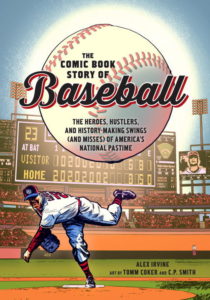By Mark Judge (CNS)
NEW YORK – ” Baseball and comic books, two colorful American originals, come together in “The Comic Book Story of Baseball: The Heroes, Hustlers, and History-Making Swings (and Misses) of America’s N ational Pastime” (Ten Speed Press) by author Alex Irvine and illustrators Tomm Coker and C.P. Smith.
ational Pastime” (Ten Speed Press) by author Alex Irvine and illustrators Tomm Coker and C.P. Smith.
This factually jam-packed and beautifully designed book is suitable for most older teens and adults. Still, parents should be cautioned: Baseball is a sport that has always included rough and crude language, a couple of instances of which are reproduced here (censored with asterisks).
There also are references to the drug use that occurred during the “steroid era” of the game in the 1990s.
The art is done in a beautiful realist style featuring artistic renderings based on reproductions of historical photographs. The basics are all here: Abner Doubleday, who supposedly invented the game in 1839 (this has been debunked as mostly myth); Babe Ruth, Ty Cobb, Cy Young, and superhuman Hall of Fame pitcher Walter Johnson.
There’s the “Murderer’s Row” 1927 New York Yankees; and Joe DiMaggio, Bob Gibson and Sandy Koufax.
More recent greats take the field as well, including (and this is a very small sampling) Lou Brock, Hank Aaron, Rickey Henderson, Greg Maddux, Roger Clemens, flipping shortstop Ozzie Smith, dazzling relief pitcher Mariano Rivera and Red Sox slugger David Ortiz. The great ballparks, like Wrigley and Fenway, are celebrated, and there’s a section on Japanese baseball.
Yet Irvine and his collaborators also cover the scandals and the more obscure history and factoids of the game. There’s the infamous 1919 “Black Sox” scandal of a World Series thrown for money, and the disgrace of black ballplayers being forced to play in the Negro Leagues until the Brooklyn Dodgers’ Jackie Robinson reintegrated the game in 1947.
In 1970, pitcher Jim Bouton published a juicy memoir, “Ball Four,” that exposed the drug use and other excesses of several players. As Irvine notes, Bouton “blew the lid off baseball’s long-held tradition of clubhouse omerta.”
There was also the modern steroid period, during which home run tallies where inflated due to performance-enhancing drugs.
On the lighter side, Irvine, Coker and Smith (names that sounds like double-play combination) reveal the quirkiness that has always been part of baseball. The Yankees were the first team to put number on their uniforms in 1929, so that fans in the “cheap seats” could identify their favorite players. There’s William Arthur “Candy” Cummings, who invented the curveball in 1867 based on how tossed clamshells flew in an arc.
Also here is Charley Pride, the Negro League player who became a country music star and now owns part of the Texas Rangers. Of course, no baseball book would be complete without Berraisms, those pithy quips from famous Yankees catcher Yogi Berra.
“Ninety percent of baseball is mental,” Berra said. “The other half is physical.” Berra was on 10 World Series teams, more than any other player.
In sum, the book amounts to a well-pitched delight.
The graphic book contains two partially censored vulgar expressions. The Catholic News Service classification is A-II – adults and adolescents. Not otherwise rated.
(Judge reviews video games and comic books for Catholic News Service.)
